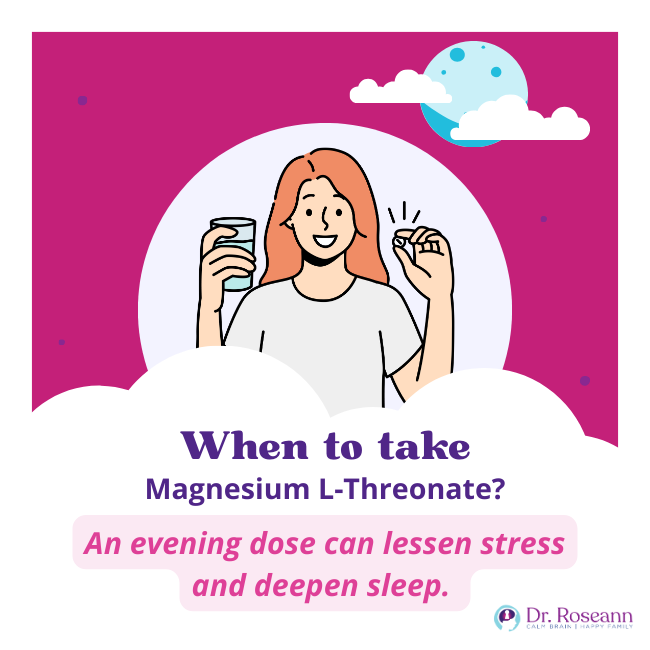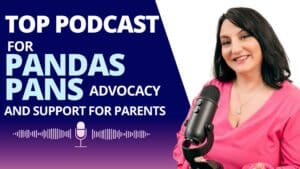Magnesium is a crucial mineral that plays a vital role in supporting healthy bodily functions, especially when it comes to the nervous system. For parents of children and teens grappling with behavioral and mental health issues, ensuring that their young ones receive the right amount of magnesium is paramount.
One effective way to do so is through Magnesium L-Threonate, a specialized form of magnesium known for its ability to cross the blood-brain barrier and improve cognitive function. In this blog, we'll explore the best times to take Magnesium L-Threonate and how it can positively impact the well-being of your child or teenager.
Taking L-Threonate in the Morning
Starting the day with Magnesium L-Threonate can set a positive tone for one’s mental and emotional well-being.
In the morning, this form of magnesium can provide an initial boost in brain function, helping one stay focused and alert throughout the day. Improved cognitive function is one of the many benefits of magnesium, making it an ideal supplement to support your child's learning and concentration.
Taking L-Threonate in the Evening
As the day winds down, so do our stress levels when we have healthy habits. Taking Magnesium L-Threonate in the evening can be particularly beneficial for children and teens struggling with stress and anxiety.
This form of magnesium can help relax the nervous system, reducing feelings of restlessness and promoting a sense of calm. When magnesium levels are balanced, it can positively impact mood, making it an excellent choice for emotional well-being.
Best Time to Take Magnesium for Stress and Anxiety
Magnesium is known for its potential to alleviate stress and anxiety. By taking Magnesium L-Threonate during times of heightened stress or anxiety, such as before a stressful event or situation, you can help your child better manage their emotional responses.
Some take one dose of magnesium l-threonate in the morning and a second in the evening or just before bed to help the brain and body calm for sleep.
Best Time to Take Magnesium for Mood
Balancing mood is essential for overall well-being. Magnesium L-Threonate can contribute to improved mood regulation, making it suitable for daily use.
Consistency in taking this supplement can lead to a more stable and positive emotional state for your child or teen. An evening dose can lessen stress and deepen sleep.
Best Time to Take Magnesium for Restful Sleep
Sleep quality is critical for children and teenagers, as it directly impacts their physical and mental development.
Magnesium L-Threonate can promote better sleep quality when taken in the evening, helping your child or teen get the restorative sleep they need. An hour before bedtime is a good rule of thumb.
Lifestyle Habits to Support Magnesium
While Magnesium L-Threonate can be a valuable addition to your child's routine, it's essential to complement it with healthy lifestyle habits. Encourage a balanced diet rich in magnesium-containing foods, such as leafy greens, nuts, and seeds.
Additionally, reduce the intake of caffeine and processed foods, which can deplete magnesium levels. Consult healthcare professionals to determine the right amount of time and dosage for your child.
Magnesium L-Threonate can be a game-changer for parents seeking natural ways to support their children's behavioral and mental health issues. Its ability to cross the blood-brain barrier and improve cognitive function, coupled with the flexibility of when it can be taken, makes it a versatile option.
By incorporating this form of magnesium into your child's routine, along with healthy lifestyle habits, you can help them achieve a brighter and more balanced future.
Always, before beginning any supplements journey, consult with a healthcare expert to determine its appropriateness and dosage for your child.
If you are ready to start with natural solutions, magnesium is often where people begin because of its positive effects on the brain and body. Magnesium L-Threonate Powder offers ease of use for the whole family.
Citations
Abbasi, B., Kimiagar, M., Sadeghniiat, K., Shirazi, M. M., Hedayati, M., & Rashidkhani, B. (2012). The effect of magnesium supplementation on primary insomnia in elderly: A double-blind placebo-controlled clinical trial. Journal of research in medical sciences : the official journal of Isfahan University of Medical Sciences, 17(12), 1161–1169. PMC3703169
Arab, A., Rafie, N., Amani, R., & Shirani, F. (2023). The Role of Magnesium in Sleep Health: a Systematic Review of Available Literature. Biological trace element research, 201(1), 121–128. https://doi.org/10.1007/s12011-022-03162-1
Chen, J. L., Zhou, X., Liu, B. L., Wei, X. H., Ding, H. L., Lin, Z. J., Zhan, H. L., Yang, F., Li, W. B., Xie, J. C., Su, M. Z., Liu, X. G., & Zhou, X. F. (2020). Normalization of magnesium deficiency attenuated mechanical allodynia, depressive-like behaviors, and memory deficits associated with cyclophosphamide-induced cystitis by inhibiting TNF-α/NF-κB signaling in female rats. Journal of neuroinflammation, 17(1), 99. https://doi.org/10.1186/s12974-020-01786-5
Slutsky, I., Abumaria, N., Wu, L. J., Huang, C., Zhang, L., Li, B., Zhao, X., Govindarajan, A., Zhao, M. G., Zhuo, M., Tonegawa, S., & Liu, G. (2010). Enhancement of learning and memory by elevating brain magnesium. Neuron, 65(2), 165–177. https://doi.org/10.1016/j.neuron.2009.12.026
Zhang, J., Mai, C. L., Xiong, Y., Lin, Z. J., Jie, Y. T., Mai, J. Z., Liu, C., Xie, M. X., Zhou, X., & Liu, X. G. (2021). The Causal Role of Magnesium Deficiency in the Neuroinflammation, Pain Hypersensitivity and Memory/Emotional Deficits in Ovariectomized and Aged Female Mice. Journal of inflammation research, 14, 6633–6656. https://doi.org/10.2147/JIR.S330894
Zhou, X., Huang, Z., Zhang, J., Chen, J. L., Yao, P. W., Mai, C. L., Mai, J. Z., Zhang, H., & Liu, X. G. (2021). Chronic Oral Administration of Magnesium-L-Threonate Prevents Oxaliplatin-Induced Memory and Emotional Deficits by Normalization of TNF-α/NF-κB Signaling in Rats. Neuroscience bulletin, 37(1), 55–69. https://doi.org/10.1007/s12264-020-00563-x
Zhang, C., Hu, Q., Li, S., Dai, F., Qian, W., Hewlings, S., Yan, T., & Wang, Y. (2022). A Magtein®, Magnesium L-Threonate, -Based Formula Improves Brain Cognitive Functions in Healthy Chinese Adults. Nutrients, 14(24), 5235. https://doi.org/10.3390/nu14245235
Are you looking for SOLUTIONS for your struggling child or teen?
Dr. Roseann and her team are all about science-backed solutions, so you are in the right place!
Grab your complimentary copy of
147 Therapist-Endorsed Self-Regulation Strategies for Children: A Practical Guide for Parents
You can get her books for parents and professionals, including: It’s Gonna Be OK™: Proven Ways to Improve Your Child’s Mental Health, Teletherapy Toolkit™ and Brain Under Attack: A Resource For Parents and Caregivers of Children With PANS, PANDAS, and Autoimmune Encephalopathy.
If you are a business or organization that needs proactive guidance to support employee mental health or an organization looking for a brand representative, check out Dr. Roseann’s professional speaking page to see how we can work together.
Dr. Roseann is a Children’s Mental Health Expert and Licensed Therapist who has been featured in/on hundreds of media outlets including The Mel Robbins Show, CBS, NBC, PIX11 NYC, Today, FORBES, CNN, The New York Times, The Washington Post, Business Insider, Women’s Day, Healthline, CNET, Parade Magazine and PARENTS. FORBES called her, “A thought leader in children’s mental health.”

She coined the terms, “Re-entry panic syndrome” and “eco-anxiety” and is a frequent contributor to media on mental health.
Dr. Roseann Capanna-Hodge has three decades of experience in working with children, teens and their families with attention-deficit hyperactivity disorder (ADHD), autism, concussion, dyslexia and learning disability, anxiety, Obsessive Compulsive Disorder (OCD), depression and mood disorder, Lyme Disease, and PANS/PANDAS using science-backed natural mental health solutions such as supplements, magnesium, nutrition, QEEG Brain maps, neurofeedback, PEMF, psychotherapy and other non-medication approaches.
She is the author of three bestselling books, It’s Gonna Be OK!: Proven Ways to Improve Your Child's Mental Health, The Teletherapy Toolkit, and Brain Under Attack. Dr. Roseann is known for offering a message of hope through science-endorsed methods that promote a calm brain.
Her trademarked BrainBehaviorResetⓇ Program and It’s Gonna be OK!Ⓡ Podcast has been a cornerstone for thousands of parents facing mental health, behavioral or neurodevelopmental challenges.
She is the founder and director of The Global Institute of Children’s Mental Health, Neurotastic™Brain Formulas and Dr. Roseann Capanna-Hodge, LLC. Dr. Roseann is a Board Certified Neurofeedback (BCN) Practitioner, a Board Member of the Northeast Region Biofeedback Society (NRBS), Certified Integrative Mental Health Professional (CIMHP) and an Amen Clinic Certified Brain Health Coach. She is also a member of The International Lyme Disease and Associated Disease Society (ILADS), The American Psychological Association (APA), Anxiety and Depression Association of America (ADAA) National Association of School Psychologists (NASP), International OCD Foundation (IOCDF).
© Roseann-Capanna-Hodge, LLC 2023











